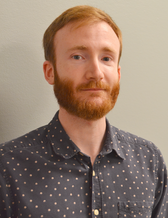- Home
- Research
- Find research
- It’s my job to learn
It’s my job to learn
John Currie is a PhD student in Cognition and Communication at the Department of Applied IT since the beginning of 2022.
John, you took the Masters of Communication programme at the

Department of Applied IT before you became a PhD student. In what way has the education been useful to you?
What I’m doing now kind of evolved out of what I wrote for my master’s thesis. The thesis course on the master’s programme I think is quite good. You have a lot of time to focus on this big project. You can research basically whatever you want. It gives you kind of a taster for what it’s like to do a PhD.
Throughout the programme, there were a lot of assignments for things with smaller research projects. And again, there was quite a bit of freedom for what kind of research we could do.
My undergraduate degree was in literature, so I hadn’t done any surveys, experiments, or discourse analysis. So to get to try these out and see what I liked - I think it was useful.
It was also a good environment to learn in. We did a lot of group work, so I got to know a lot of the other students and learn from them. Since the class sizes weren’t all that big, I also felt that there wasn’t such a big distance between the students and the teachers.
What’s the most interesting part about being a PhD student?
A lot of things. I like that it’s my job to learn more. It’s really cool, I really like that. I get to learn new skills as well as new research.
So, for example, I’ve presented my work quite a few times now at seminars and conferences and each time I do it, I feel more confident about presenting and talking about what I do.
What’s the hardest part then?
It’s nice to have control over your own time, but you have to be good at motivating yourself. I come to the office reasonably often. I think it’s good for me to separate home from work. Sometimes I might go to a library to read for a while. I try to be conscious about my own working patterns. Every week I usually start by writing a to-do list on what I want to do that week. But it’s still difficult.
Any advice for someone who is considering a PhD career after graduating?
I was thinking when I was doing my master’s programme that I didn’t want to be motivated by the grades necessarily. I wanted to be pleased with the work that I was doing. It’s useful to keep that if you are trying to do a PhD, because most of the stuff you are doing isn’t being graded. So it’s very different from other university experiences.
In Sweden and Scandinavia it’s kind of competitive. Maybe it’s good to be aware of that. If you expect to get the first position you apply for, that probably won’t happen. A lot of work goes into each application.
How would you describe your research?
It’s basically about how climate change is understood and conceptualized, especially in terms of metaphors that are used to talk about it. I’m mostly using discourse analysis and corpus linguistics. I’m planning to do my PhD by publication and, for example, a paper I’m working on just now compares discourses of news media, parliamentary data, climate activists / NGOs, and IPCC reports.
What’s your plan after defending your thesis?
I have some experience from teaching English as a second language, so I can see myself staying in academia, because I enjoy teaching as well as carrying out research. But it’s quite far away, so I’m open to other options.
